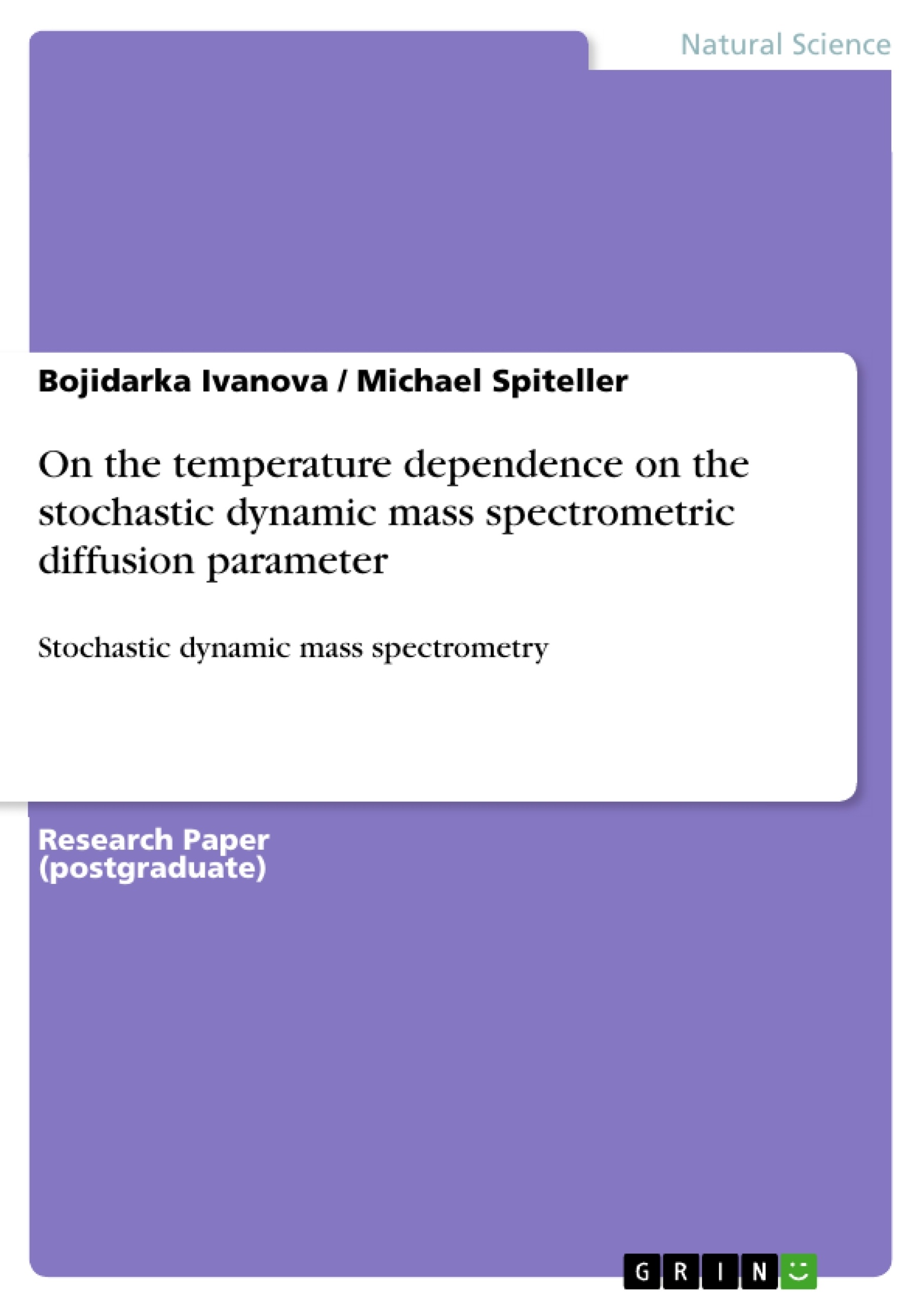The major aim of this work is to introduce our new model equation connecting among the so–called stochastic dynamic diffusion coefficient “DSD,” the experimental mass spectrometric outcome intensity “I” and the experimental parameter temperature “T,” respectively. A closer review of our contributions, so far, to the domain of the “stochastic dynamic mass spectrometry” has shown that we have developed a functional relationship between the DSD parameter and the mass spectrometric intensity. It is . Its universal applicability to a set of soft–ionization mass spectrometric methods has been evidenced within a small–scale research on correlation between theory and experiment, which has been tested by chemometrics. As a corollary, there has been concluded that the temporal behaviour of the experimental mass spectrometric intensity obeys a certain law and this law is the equation shown above. The fundamental differences in the functional relationship written before and our new innovative model lies in that we account for the effect of the temperature on the DSD parameter and the experimental mass spectrometric measurable variable. The roots of the latter model are again to stochastic plausibility theories, focusing the attention on the Gillespie’s exact numerical solution of the Ornstein–Uhlenbeck process according to the forward Fokker–Planck equation (or the forward Kolmogorov equation) and the theory of continuous Markov processes. We shall not only introduce, a new functional relation, but also we shall provide persuasive empirical proofs of that the new formula is true. The contribution explores our own experimental mass spectrometric data.
The discussion, herein, provides sufficient justification, that the content of the work would be of interest in MSc students specializing in “Advanced methods for the Analytical Chemistry” or “Environmental Chemistry;” students specializing in “Theoretical and computational chemistry;” and PhD students or researchers developing the mass spectrometric methodology.
Inhaltsverzeichnis (Table of Contents)
- Abstract
- Introductions
- Theory
- Results
- Discussion
- Conclusion
- Reference
Zielsetzung und Themenschwerpunkte (Objectives and Key Themes)
The main objective of this work is to introduce a new model equation that connects the stochastic dynamic diffusion coefficient (DSD), the experimental mass spectrometric outcome intensity (I), and the experimental parameter temperature (T). This new model builds upon previous research on the relationship between DSD and mass spectrometric intensity, taking into account the effect of temperature on the DSD parameter.
- Development of a new model equation relating DSD, mass spectrometric intensity, and temperature
- Stochastic plausibility theories, focusing on the Gillespie's exact numerical solution of the Ornstein-Uhlenbeck process
- Empirical proofs of the new model equation using experimental mass spectrometric data
- Application of the new model equation to various soft-ionization mass spectrometric methods
- Correlation between theory and experiment tested by chemometrics
Zusammenfassung der Kapitel (Chapter Summaries)
- Abstract: Provides a concise overview of the work, outlining the new model equation and its key features.
- Introductions: Introduces the topic of stochastic dynamic mass spectrometry and the existing knowledge on the relationship between DSD and mass spectrometric intensity. It highlights the need to incorporate temperature effects in the model.
- Theory: Delves into the theoretical underpinnings of the new model equation, drawing upon stochastic plausibility theories, particularly the Gillespie's exact numerical solution of the Ornstein-Uhlenbeck process.
- Results: Presents the empirical results obtained from the experimental mass spectrometric data, validating the new model equation and its applicability to various soft-ionization mass spectrometric methods.
- Discussion: Analyzes the results and discusses the implications of the new model equation, emphasizing its potential impact on the field of mass spectrometry.
Schlüsselwörter (Keywords)
The key terms and focus topics of this work include stochastic dynamic mass spectrometry, diffusion coefficient (DSD), mass spectrometric intensity, temperature dependence, Gillespie's exact numerical solution, Ornstein-Uhlenbeck process, soft-ionization mass spectrometric methods, chemometrics, and empirical validation.
Frequently Asked Questions
What is the new model equation introduced in this study?
The work introduces a functional relationship connecting the stochastic dynamic diffusion coefficient (DSD), mass spectrometric intensity (I), and temperature (T).
Why is temperature an important factor in this model?
The new model accounts for the effect of temperature on the DSD parameter and the measurable mass spectrometric variables, which was a gap in previous functional relations.
What are the theoretical roots of this research?
The model is based on stochastic plausibility theories, specifically Gillespie’s numerical solution of the Ornstein–Uhlenbeck process and continuous Markov processes.
To which mass spectrometric methods can this model be applied?
It is applicable to a set of soft-ionization mass spectrometric methods, as evidenced by chemometric testing and empirical data.
Who is the target audience for this scientific work?
The work is intended for MSc and PhD students or researchers specializing in Analytical Chemistry, Environmental Chemistry, or Theoretical and Computational Chemistry.
- Quote paper
- Prof. Dr. Bojidarka Ivanova (Author), Michael Spiteller (Author), 2019, On the temperature dependence on the stochastic dynamic mass spectrometric diffusion parameter, Munich, GRIN Verlag, https://www.grin.com/document/492920



